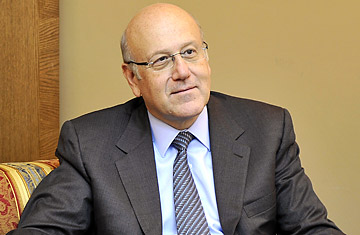
Lebanon's prime minister-designate Najib Mikati arrives in Parliament at the start of consultations on the forming of a new Cabinet, on January 27, 2011, in Beirut.
(2 of 2)
Of course, there is more at stake than the accurate application of international law. If it is revealed in a convincing manner that Hizballah was behind the assassination, it would severely discredit the movement. Alone among Lebanon's multiple sectarian factions, which were disarmed at the end of the civil war, Hizballah maintains a powerful militia that it claims is dedicated to an anti-Israeli "resistance." If it turns out that Hizballah's guns were turned inward instead of at neighboring Israel, the movement would lose substantial support within the country. Such a revelation would surely rekindle domestic and international efforts to disarm the militia, which is as powerful, if not more so, than Lebanon's army.
Though Hizballah has historically held a strong position in Lebanon's government, it has demonstrated little inclination to rule; instead placing a priority on protecting its military assets. So when Saad Hariri, who had been in power since his western-leaning coalition swept the elections in 2009, refused to denounce the STL, the sleeping giant rumbled to life. Hizballah convinced smaller parties in Hariri's coalition to defect in order to save the nation from certain strife, forcing the collapse of his government and handing the country to the very movement that may be accused of murdering his father.
As the Hizballah coalition's new front man, Mikati, who is known as much for his philanthropy as his business acumen, was expected to denounce the tribunal. So far, he has said little, focusing instead on building a government of technocrats and ministers that will see Lebanon through to the next election. This is how it should be, says Karim Makdisi, a political sciences professor at the American University of Beirut, who scoffs at the popular notion that Mikati is a Hizballah puppet. "Mikati doesn't owe anything to Hizballah, neither his business or his political career. He doesn't need their support to get votes. He is a political opportunist like all politicians."
That may be the case, but members of Hizballah's coalition certainly expect him to come around to their point of view. "What we want is for him to rescue Lebanon and to protect the Resistance from the indictments," says parliamentarian Kasim Hashim, whose party is part of the Hizballah block. "If the Tribunal is targeting the Resistance, he will reject the indictments." Hariri's refusal to denounce the tribunal, followed by his subsequent ouster, has many speculating that the same would happen to Mikati if he doesn't toe Hezbollah's line. Salem, of the Carnegie Middle East center, believes that to be a misreading of Hizballah's concerns: "What they want is assurances, predictability." And Mikati, a lifelong centrist with extensive business relations in Lebanon, the Middle East and in Europe, is not going to do anything to jeopardize those interests. And that is in the interest of Hizballah. "With Hariri, Hizballah was on the back foot," says Salem. "They didn't have a majority, they weren't in government, and they didn't trust the prime minister. So that was why they were saying you have got to break completely with the STL. With Mikati they are not panicking anymore, because they trust him."
For his part, Mikati maintains his independence. "There were no preconditions to my nomination," he tells TIME. "If I want to change anything about the process of the tribunal, it has to be done in dialogue and with the consensus of all Lebanese." Such a consensus will be difficult to achieve. In order to get Lebanon's Sunnis to accept anything less than the full application of the STL's ruling, he would need the assistance of Hariri, who, as the son of the murdered man, is the only one who could convince his followers of the importance of making a compromise. So far, Hariri has proved resistant to Mikati's pleas. He now sits in opposition, and has planned a massive rally on March 14 to make a stand against Hizballah.
In the face of Hariri's refusal to join his new coalition, Mikati has promised a government largely comprised of technocrats who can at least get the country going if it can't solve larger existential issues. So far, he has been unsuccessful. And that may be the solution everyone is looking for. If the STL findings are released when there is no government in place, then there will be no one to decide on a formal response, and no one who can be blamed. In that case, failure may be Mikati's best success yet.
With reporting by Rami Aysha and Nicholas Blanford/Beirut
